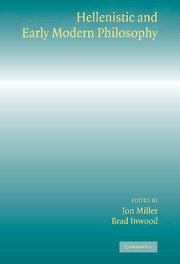Book contents
- Frontmatter
- Contents
- List of Abbreviations
- Notes on Contributors
- Preface
- Introduction
- 1 Stoicism in the Philosophical Tradition
- 2 Early Modern Uses of Hellenistic Philosophy
- 3 Locke's Offices
- 4 Patience sans Espérance: Leibniz's Critique of Stoicism
- 5 Epicureanism in Early Modern Philosophy
- 6 Stoics, Grotius, and Spinoza on Moral Deliberation
- 7 The Discourse on the Method and the Tradition of Intellectual Autobiography
- 8 Subjectivity, Ancient and Modern
- 9 Spinoza and Philo
- 10 Hume's Scepticism and Ancient Scepticisms
- 11 Stoic Naturalism in Butler
- Bibliography of Primary Sources
- Bibliography of Secondary Sources
- Index (general)
- Index (of selected text passages)
7 - The Discourse on the Method and the Tradition of Intellectual Autobiography
Published online by Cambridge University Press: 05 August 2012
- Frontmatter
- Contents
- List of Abbreviations
- Notes on Contributors
- Preface
- Introduction
- 1 Stoicism in the Philosophical Tradition
- 2 Early Modern Uses of Hellenistic Philosophy
- 3 Locke's Offices
- 4 Patience sans Espérance: Leibniz's Critique of Stoicism
- 5 Epicureanism in Early Modern Philosophy
- 6 Stoics, Grotius, and Spinoza on Moral Deliberation
- 7 The Discourse on the Method and the Tradition of Intellectual Autobiography
- 8 Subjectivity, Ancient and Modern
- 9 Spinoza and Philo
- 10 Hume's Scepticism and Ancient Scepticisms
- 11 Stoic Naturalism in Butler
- Bibliography of Primary Sources
- Bibliography of Secondary Sources
- Index (general)
- Index (of selected text passages)
Summary
The Discourse and Its Genre
When Descartes' mathematics, and what was true in his physics, were surpassed, and what was false in his physics was refuted and ridiculed, the two main works that survived the wreck, and continue to shape our picture of the man, were the Discourse on the Method and the Meditations. Of these, the Meditations is less personal. The Meditator of the Meditations is not specifically René Descartes. Rather he, or she, is a role that any of us can fill if we choose to pursue this path of thinking. By contrast, the Discourse presents to us the life and aims and undertakings, not precisely of René Descartes – for the original 1637 publication was anonymous – but at any rate of the person who is the author of the Essays that the Discourse introduces (the Geometry, the Dioptrics, and the Meteors), who has made many new discoveries through a special method of “searching for truth in the sciences” and who is also the author of some more mysterious treatises that he has chosen not to publish. The Discourse presents this impressive but anonymous person as having made an almost-complete break with the traditional disciplines in which he was educated; he begins his own intellectual work, when he does begin it, not from the lessons of his teachers or from books or from what he learned by travelling in “the book of the world,” but from his own private reflections that lead him to the method described in Part Two.
- Type
- Chapter
- Information
- Hellenistic and Early Modern Philosophy , pp. 141 - 191Publisher: Cambridge University PressPrint publication year: 2003
- 19
- Cited by

